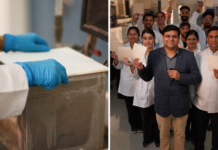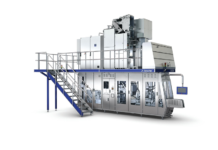Central and State Governments are taking all steps to ensure the supply of essential items during the lockdown to combat the novel Coronavirus. To prevent the spread of coronavirus, hand sanitizers are used by the public, health workers, and hospitals. The demand of sanitizers is increasing day by day and maintaining demand and supply balance, State Government authorities including Excise Commissioners, Cane Commissioners, Drug Controllers as well as District Collectors of various states have been advised to remove any bottlenecks in the supply of ethanol or ENA to manufacturers of hand sanitizers and to give permissions or licenses to the applicants including distilleries who intend to manufacture hand sanitizers. Distilleries and Sugar mills that can produce hand sanitizers in bulk have also been motivated to make hand sanitizers. These manufacturers have also been asked to work in three shifts to maximize their output.
About 45 distilleries and 564 other manufacturers have been granted permission to produce hand sanitizers; more than 55 distilleries are likely to be permitted in one or two days; and many more are being motivated to produce sanitizers in this scenario. Most of them have commenced production and others are likely to start production in a week; thus, there will be a sufficient supply of hand sanitizers for the consumers and hospitals.
To ensure that hand sanitizers are made available to the general public and hospitals at a reasonable price, the Government has also fixed the Maximum Retail Price of sanitizers. The retail prices of hand sanitizers shall not be more than Rs 100 each bottle of 200ml; the prices of other quantities of hand sanitizers shall be fixed in the proportion of these prices.
IndiFoodBev — authentic, impactful and influential
An English-language food and beverage processing and packaging industry B2B platform in print and web, IndiFoodBev is in its third year of publication. It is said that the Indian food and beverage industries represent approximately US$ 900 billion in revenues which implies more than 20% of the country’s GDP. Eliminating the wastage on the farmside can help to deliver more protein to a higher number of the population apart from generating sizable exports. The savings in soil, seeds, water, fertilizer, energy and ultimately food and nutrition could be the most immense contribution that country is poised to make to the moderation of climate change.
To improve your marketing and grow sales to the food and beverage processing and packaging industry, talk to us. Our research and consulting company IppStar [www.ippstar.org] can assess your potential and addressable markets in light of the competition. We can discuss marketing, communication, and sales strategies for market entry and growth.
Suppliers and service providers with a strategy and budget for targeted marketing can discuss using our hybrid print, web, video, and social media channels to create brand recognition linked to market relevance. Our technical writers are ready to meet you and your customers for content.
The second largest producer of fruit and vegetables in the world is continuously expanding processing capacities and delivery systems with appropriate innovative technologies. We cover product and consumer trends, nutrition, processing, research, equipment and packaging from farm to thali. Get our 2025 media kit and recalibrate your role in this dynamic market. Enhance your visibility and relevance to existing markets and turn potential customers into conversations. Ask for a sample copy of our bi-monthly in print or our weekly IndiFoodBev eZine each Wednesday.
For editorial info@ippgroup.in — for advertisement ads1@ippgroup.in and for subscriptions subscription@ippgroup.in
Naresh Khanna – 10 February 2025
Subscribe Now











